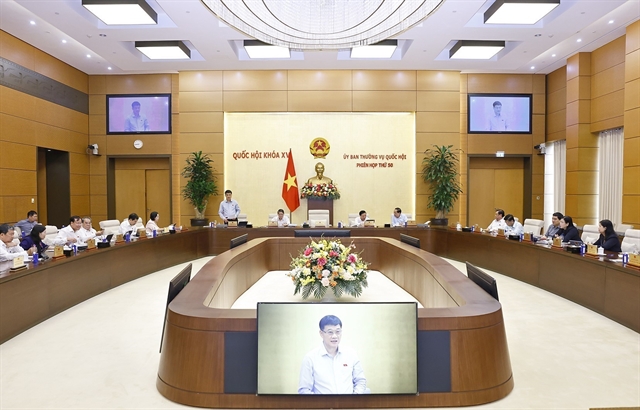 Politics & Law
Politics & Law

 |
| NA vice chairman Vũ Hồng Thanh speaks at the session discussing the Law on Insurance Business. VNA/VNS Photo |
HÀ NỘI — The National Assembly Standing Committee, at its 50th session on Monday, examined draft amendments on investment business, citizen reception and complaint and denunciation laws, highlighting priorities in digital transformation, decentralisation and stronger State management.
According to the Government’s proposal, the draft amendment to the Law on Insurance Business is designed to facilitate business activities in this sector by simplifying administrative procedures and addressing current bottlenecks.
The draft is also better aligned with the Inspection Law and the Enterprise Law, and includes articles that refine regulations related to capital and management, ensuring safe and effective investment operations.
The NA’s Committee on Economy and Finance agreed on the necessity of enacting the law and recommended that the drafting committee continue their review and revision in a way that comprehensively defines the State’s management of insurance business activities, creating a sound legal framework for effective decentralisation in this field.
Reporting on the conditions for capital contributors to establish insurance and reinsurance businesses (as limited liability companies), and for granting licences for insurance brokerage companies, the drafting committee noted that removing barriers to market access and ensuring a transparent business environment was necessary.
However, they noted that the current requirements were important to vetting the legal status, credibility, competence and legal compliance of foreign organisations when contributing capital to establish insurance businesses.
If some of these conditions are removed in the amendment, alternative solutions and post-inspection measures should be considered to ensure market safety.
At the discussion, the NA Standing Committee agreed on the need to amend the 2022 Insurance Business Law, and recommended that the drafting committee collaborate with the relevant agency to conduct further research and clarify the political, legal and practical basis, assessing the current conditions and the obstacles that have arisen since the law came into effect three years ago.
NA vice chairman Vũ Hồng Thanh also underscored the application of science and technology and digital transformation to continue simplifying administrative procedures.
He stressed the need for a comprehensive assessment of the impact and legal consequences of reducing investment business conditions while ensuring the legitimate rights and interests of involved parties. Appropriate inspection, monitoring and supervision mechanisms to avoid legal gaps in the state management of the insurance sector should also be a must, he said.
Amendments to strengthen citizen reception and State management
The draft law proposes updates to several key regulations to make the Government’s inspection and complaint-handling systems more streamlined, transparent and responsive. It seeks to align with the Party’s direction on reorganising the political system, adopting a two-tier local government model and improving the performance of public administration.
One of the main highlights of the draft is the introduction of online citizen reception, allowing people to communicate directly with government offices via digital platforms. Citizens will also be able to use their national ID numbers or electronic identification codes instead of physical documents when attending citizen reception sessions.
The amendments also aim to promote decentralisation and administrative reform, authorising the Prime Minister to delegate certain responsibilities to the Government Inspector General in handling denunciations. They introduce new mechanisms to clarify jurisdiction when legal authority is unclear and give the Government the power to define how online citizen reception will operate nationwide.
According to the Chairman of the National Assembly’s Committee on People’s Aspirations and Supervision, Dương Thanh Bình, most committee members supported the addition of online citizen reception, saying it would help speed up digital transformation, make it easier for people to file complaints and reduce the workload at physical offices.
However, he suggested that the Government should assess the effectiveness of the model so far, particularly in terms of technical infrastructure and connectivity between central and local-level offices to ensure smooth operation.
Vice Chairwoman of the National Assembly Nguyễn Thị Thanh also supported the move, saying it would reflect the country’s growing use of technology across all areas and help save time and costs for citizens. She noted, however, that the definition of 'citizen reception' in the law should be updated, as it currently only refers to in-person meetings.
She emphasised that the definition must also include online interaction, given the proposed digital format.
Thanh further pointed out that citizen reception and complaint resolution were closely linked to human and civil rights. She warned that in the past, delays and prolonged cases often occurred when officials delegated their duties to subordinates instead of handling complaints directly.
She therefore called for clearer rules on delegation and accountability, ensuring they comply with the Law on Government Organisation and the Law on Organisation of Local Government, to make sure citizens’ rights would be properly protected and cases would be handled efficiently. VNS